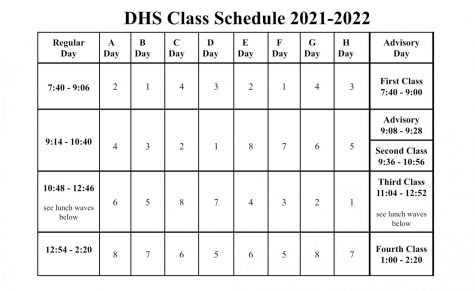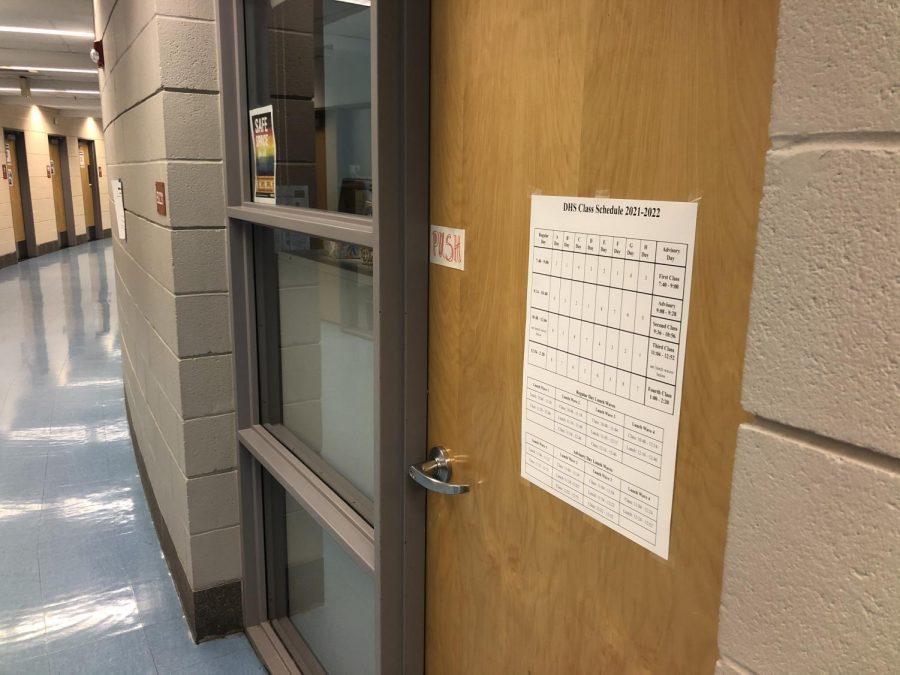Basis Behind the Block: Pandemic Accelerated DHS’ Long-Awaited Block Schedule Implementation
The rationale behind the school’s switch last year to block scheduling is rooted in the pandemic. But those roots were planted a long time ago.
Through the eyes of a student: block schedule, evidently still a source of confusion, taped to DHS classroom door
September 30, 2021
It turns out Covid-19 has borne a positive at Darien High School. While it’s too early to conclusively label the school’s shift to block scheduling as positive or negative, Covid-19 did offer DHS faculty a long-awaited opportunity: a true trial run.
Block scheduling, a change implemented last year transforming seven 48-minute periods into four 85-minute (now 86-minute) periods, “has been on the minds of people here for years,” Assistant Principal Mr. Mark Mazzone said.

The Covid-19 pandemic, Mr. Mazzone communicated, was the perfect opportunity to test it. Implemented primarily as one of the school’s many Covid protocols—this one intended to limit the number of people students and staff came into contact with daily—the change served a dual purpose: it allowed the school to begin receiving feedback about block scheduling earlier than expected.
While school staff had been discussing the implementation of block scheduling for years, Mr. Mazzone said it is impossible to say when block scheduling would have first been implemented without Covid—but definitely not last year. It made perfect sense to start with Covid protocols last fall, albeit certain benefits of block scheduling – including group work and labs – were impossible given Covid restrictions.
The pandemic, Mr. Mazzone explained, “forced our hand”.
And, while he admitted that the school was rushed into block scheduling without the hoped-for amount of time to plan, they were grateful for the opportunity to turn predicted pros and cons to realized pros and cons.
So, what are the proposed pros of block scheduling? What about block scheduling is so good that the probability of an American high school using some form of block scheduling has increased from virtually zero to thirty-three percent in recent years according to the the American Association of School Administrators? What, as the Stamford High School Round Table mentioned, has block scheduling “the talk around Stamford Public Schools,” (their magnet school, AITE, now operates on a block schedule) “and many other school districts?”
For starters, colleges have been operating on a block schedule since the beginning of time, holding classes within the one-to-two-hour range on average. Common sense would dictate that implementing this sort of schedule in high school would better prepare prospective college students for the future.
But there are a host of other benefits to the longer periods.
According to Mr. Mazzone, block scheduling allows students to delve more deeply into each class, creating more time for inquiry, problem-solving, discussion, group work, and discovery.
Practically speaking, it is more conducive to hands-on classes in the art, technology education, and science departments, where set-up and clean-up once consumed up to half of the 48-minute periods.
Mr. Mazzone also mentioned the increased flexibility afforded to students by the block schedule, as students are now given a two days’ notice about any assignment, allowing them to better plan homework around their busy schedules.
The cons of the new model? You guessed it: 85 minutes can feel very long for students and teachers alike. But that’s it. According to Mr. Mazzone, that is “really the only con we’ve heard.”
Naturally, I ventured to ask peers of mine, those who had experienced both the old and new schedule, to share their opinions.

Right: 2019 DHS student’s schedule
Have it be noted that the student on the left is a senior with an extra free period
I happened upon a variety of feedback. Senior Thomas Dupont echoed administration’s hope for block scheduling, commenting on the increased amount of “time to ask questions and get help from teachers.”
Additionally, a student I spoke with highlighted the benefit of having an extra night to do homework.
One pro I couldn’t stop hearing from DHS students—but one not mentioned by Mr. Mazzone (perhaps because it has very little to do with actual academic instruction)—was the longer free periods, byproducts of the block schedule. Three of the four students I spoke with had something positive to say about the altered free periods, with senior Daniel MacLehose going so far as to say “block scheduling is my favorite thing when I have a free.”
In terms of cons, Mr. Mazzone hit the nail on the head. Three of the four students made some remark about the difficulty of “pay[ing] attention for one hour and twenty six minutes,” as senior Aidan Amirsakis put it.
One interesting thing I was reminded of was the fact that students no longer see as many friends per day as they once did. MacLehose “miss[es] being able to see [his] buddies in class every day.”
As Mr. Mazzone put it, the school is “still in the trial period.” To “get a real gauge” of the effectiveness of block scheduling, DHS staff and administration “will talk to students” and continue “weighing the pros and cons.” Fortunately, they will receive a more accurate gauge this year, with Covid regulations having loosened enough to allow teachers to take the fullest advantage of the block schedule model, letting students move around, rearrange desks, and work in groups.
Don’t get it wrong; block scheduling at DHS is still a Covid-19 protocol rather than the determined schedule of the future. But, if all goes as planned (and students grow accustomed to sitting in the same room for 86 minutes), it may very well be the schedule on the walls for many years to come.









